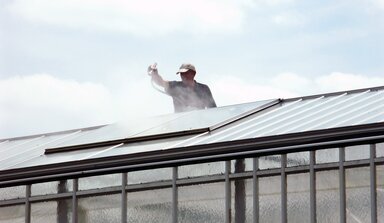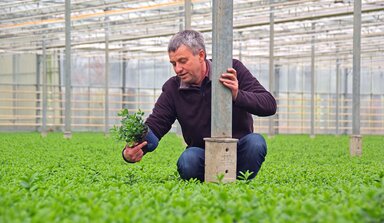Lilies protected under ReduSol
Growing lilies without a shading agent is just about impossible. J&R Groenewegen of ’s Gravenzande, the Netherlands, have been using ReduSol for as long as it’s been on the market. “We are really pleased with it; we’ve not tried any other manner of shading since.”
John and René Groenewegen grow Orientals in the soil under 18,500 m² of glass. It is a sensitive crop. Lilies don’t like the cold but they also don’t like it too warm. So when the radiation starts to rise in the spring you need to be careful. “Without some sort of shade you’re not able to grow a good product. The buds burn too quickly,” says René Groenewegen. “Early in the spring, if the radiation is high, we close the energy screens. In mid-April ReduSol is sprayed onto the roof. It’s a case of: Better one week too early than a day too late. I never wait until the last day; the whitewash contractor doesn’t come on demand. When it’s dark in April sometimes we see a decline in growth under the coating. But you have to put up with that; it’s better than enduring the damage.”

John and René Groenewegen
They have been using ReduSol since it has been on the market and have not tried anything else since then. “The big advantage is its durability. You spray it on just once and in September you spray it off again, just once, with ReduClean. It doesn’t have to rain immediately. Even after a week it rinses clean in the rain,” he says. Once ReduSol is on the roof he hardly needs to use the screens again. Only on the hottest days in the summer, it is sometimes necessary to close them for a few hours. That is a maximum of ten days in the year. “You could make the layer of coating thicker so that it could also cope with these days but then you lose more light. This way works well.” The art is to grow the crop under summer conditions as cool as possible. That still requires a lot of ventilation, even with the coating.
“We don’t want to take any risks by trying any other products. The crop is too sensitive for that. We can’t afford any harm occurring.”

